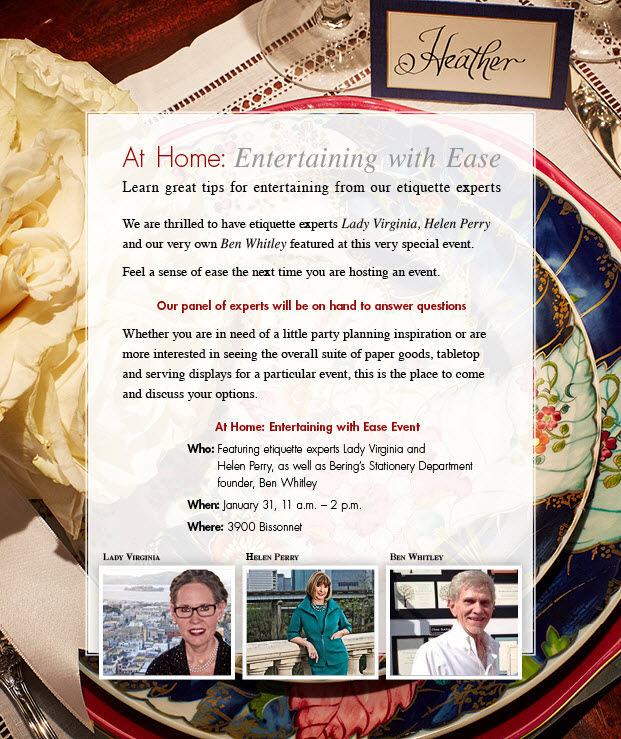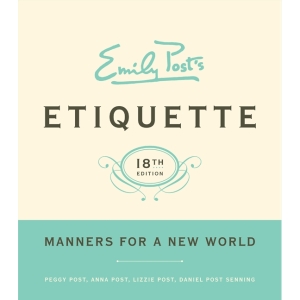Social Grace with Lady Virginia
Marketing for Bering’s lends itself to meeting some truly magnificent customers as well as featured guests. However, it is a genuine treat when a valued customer evolves into a featured guest that we are able to get to know even better! While Lady Virginia has been a Bering’s customer for some time now, we are thrilled to have her as a featured guest at this Saturday’s At Home: Entertaining with Ease Event. It will be an event like none we have hosted before, featuring Lady Virginia, Helen Perry and Ben Whitley. All three guests will delight you with advice on entertaining in your own home, while sharing museum style vignettes centered on life’s many events. It will be a come and go event this Saturday at our 3900 Bissonnet location from 11 a.m. – 2 p.m.
While all three of our featured guests are full of beautifully terrific words of wisdom, we are especially excited to share a question and answer dialogue we recently had with Lady Virginia, on Social Grace for your life.
Bering’s Interview with Lady Virginia.
Bering’s: How did you get started with Etiquette?
Lady Virginia: It started quite innocently when, as a child I ran across my grandmother’ 1928 copy of Emily Post’s book, Etiquette, “The Blue Book of Social Usage.” Richard Duffy’s introduction caught my attention. He explained that etiquette is a system of rules of conduct based on self-respect and the respect of others. As I read further, I was inspired by Emily Post’s motivation to write her book. She recognized that the vast number of people moving into the city from the farms, were at a disadvantage because they didn’t know the rules of city society. Her goal was to instruct these new comers in the rules of what she called “GOOD SOCIETY.” Her thorough and detailed explanations, equipped the reader to be part of the community and not outsiders. Before Emily Post’s road map to good manners, etiquette could be used as a barrier or weapon. Instead, she wanted it to be used as a bridge. It’s all about building relationships. She also recognized the importance of using kindness and good judgment. She encouraged people to do the right thing, at the right time and for the right reason. In her concept of etiquette, if using the right fork embarrassed someone, then it would be proper etiquette to use the wrong fork. She felt you have to learn the rules first so that you know when and how to apply them.
Bering’s: Where did the rules come from?
Lady Virginia: For the most part, the rules developed to address some practical need. Though most of the origins are lost in obscurity, many of them can be explained. My mission is to research the origins of the rules in order to demystify them for people today. If you understand the why, they become less arbitrary and threatening.
Bering’s: What examples come to mind?
Lady Virginia: My favorite example is the admonition not to put your elbows on the table. We were all told by our mothers to keep our elbows off the table but she never told us why. To find the reason, we go back to the Middle Ages. The dinning tables that we know today didn’t exist. Instead when it was time to eat; large planks of wood were placed over trestle legs, which resembled sawhorses. These planks were not nailed down because they would be removed after the meal. Thus, if someone leaned on the table they would cause it to flip over. The origin may not apply today but it may still be a good idea not to put elbows on the table while eating. We wash our hands before we eat but we don’t generally wash up as far as our elbows and/or the sleeves of our garments may not be that clean either. So, given our understanding of germs, perhaps it is appropriate not to place our elbows on the table. However, after the meal as we visit over coffee, I think it is forgivable to lean forward with elbows on the table to engage in a conversation.
Bering’s: Are the rules of etiquette universal worldwide?
Lady Virginia: No, there are variations and each culture has its own standards. Often those standards develop when people begin to gather in clusters, communities or cities. After all, if you are living alone, it really doesn’t matter. As civilization develops, behavior becomes more important. Therefore, some of the cultural differences reflect the historical time when those cities developed.
Bering’s: Can you give us an example?
Lady Virginia: In America we place our hands in our lap at the dining table. However, in Europe it is expected that you keep your hands on the table at all times. Why the difference? When dining etiquette was developed in Europe, there was a greater threat that someone would use that knife to stab you rather than cut up the green beans on the plate. Thus, you were expected to have your hands visible at all times. When America was being settled, and the standards were being established, life in the cities was a bit more civilized and hands when not being used to convey food from the plate to the mouth were expected to rest gently in the lap. Also, the image of someone with both hands on the table looked rather like they are trying to guard their food from being taken away from them. This was insulting to the host who took pride in displaying wealth by providing an abundance of food for his guests.
Bering’s: How can people learn good manners?
Lady Virginia: There are many excellent and easy to read books. Classes are available both for personal instruction and for groups. The place to practice the rules is at home. Children are learning eating habits from their day to day experience at home. They will reflect what they see. Sitting down to a meal at a table with plates and flatware on the table will teach children how to act and be polite in public. It only helps to know the rules if you then practice them. I also hope that people will consult my websites for detailed explanations and I invite them to ask etiquette questions.
Bering’s: What will you be showing at the Berings Bissonnet event on January 31st?
Lady Virginia: I have the privilege of being a part of this event with two distinguished and well-known professionals, Helen Perry and Ben Whitley. We will each be hosting vignettes to illustrate various ways to entertain graciously. I will be highlighting a formal cocktail buffet, various dinner settings and a cozy afternoon tea. I’ve been a devoted customer of Bering’s for 35 of their 75 years so it’s a real thrill for me to be participating in their celebration year.











